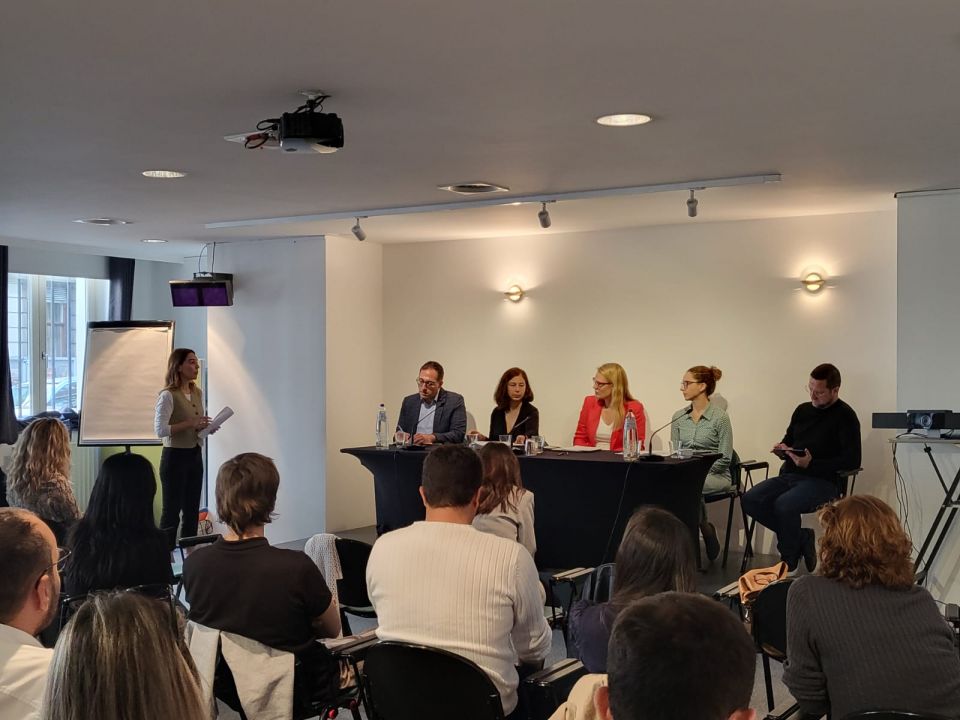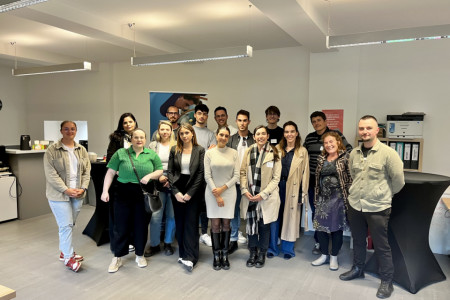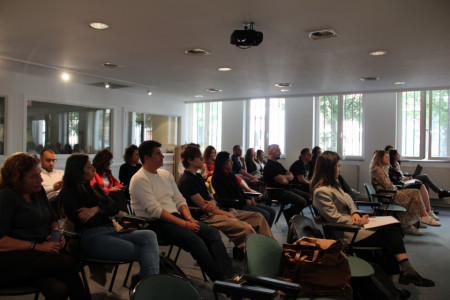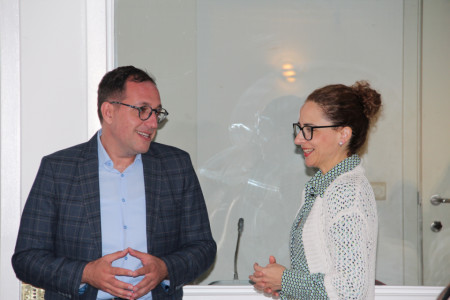As part of the project "Virtual internships for an inclusive society", a study visit to Brussels was organized from 13 to 17 May. The participants of the visit were representatives of partner organizations of the project and participants of different models of virtual internships, who had the opportunity to share their observations and dilemmas during a panel discussion with representatives of institutions and organizations that deal with young people in different fields to enable them to integrate into society and realize their potential. In addition, the participants visited several organizations working with and for young people at the EU level, using their capacities to enable young people to develop employability skills, with a particular focus on young people from vulnerable groups.
The study visit provided an opportunity for networking and sharing knowledge and examples of good practice in the field of creating a stimulating environment and engaging in a dialog with decision-makers at the national and EU level to enable young people, especially members of different vulnerable social groups, to become equal members of society. The organizations visited by the participants explained in detail their activities in the field of realizing the rights of young people, especially in the areas of education, training, working practices, housing, and mobility of young people. In addition, the participants of the study visit had the opportunity to find out what the process of advocacy with the European Union institutions looks like and to learn about the challenges youth, especially students, students, and unemployed young people, face when entering the labor market.
On the first day, a panel discussion was held with representatives of institutions and organizations active at the EU level: Out of the Box International, Lifelong Learning Platform, Regional Cooperation Council, Connect International i Institutute for good governance and Euro Atlantic perspective. The discussion provided the participants of the study visit with an insight into the framework for developing and implementing public policies in the field of vocational development and training of young people. A comparative analysis of the legal framework at the level of EU Member States and candidate countries provided a framework for the further development and improvement of the legal and practical framework for the professional development of young people. The discussion focused on the digital component of acquiring new knowledge and experience for young people by sharing perspectives and insights on virtual forms of internships for young people.
The Organising Bureau of European School Student Unions (OBESSU)
The Organizational Bureau is a platform for cooperation and networking of student associations, established to create a forum that gathers all relevant information for building a base of advocacy initiatives towards EU institutions and other relevant actors in the field of education. All advocacy activities aim to improve the position of European students and strengthen their ability to participate in the decision-making process. In addition to the various project initiatives, OBESSU organizes various public events aimed at informing the general public about the position of students in Europe and giving them the opportunity to engage with decision-makers. The focus of the discussion and exchange of ideas was on student mental health issues, but also on the role of teachers and school staff in supporting students.
The European Vocational Training Association (EVTA)
The European Vocational Training Association is the leading European network in the field of vocational education and training. Through its activities, it supports organizations in the development capacity to improve VET at the European level and creates and develops various discussion forums to exchange knowledge and experience to improve the field of VET. EVTA focuses most of its activities on networking and building a dialog for cooperation between policymakers, VET providers, social partners, and all interested parties so that VET development can be realized by European standards. EVTA conducts various training courses and trainings in the areas of company restructuring processes, learning outcomes-based approaches, work-based learning, internationalization in VET, mobility, and the use and application of European reference tools. As EVTA organizes various training seminars, the participants exchanged views with the representatives of this organization on green skills, green jobs, and various advocacy initiatives aimed at regulating this area more closely.
European Students' Union (ESU)
The European Students' Union is an umbrella organization of 45 national student associations from 40 European countries. ESU promotes and represents the educational, social, economic, and cultural interests of almost 20 million students in all major European decision-making bodies: the European Union, the Council of Europe, UNESCO, and the Bologna Monitoring Group. ESU not only represents the views, needs, and perspectives of European students but also aims to ensure and strengthen student participation and increase student input into higher education policy and decision-making at local, national, and European levels. The fundamental value that the ESU stands for in this area is the system of higher education based on the values of quality, equality, and accessibility for all. The basic mechanisms of the Union's work are building links and promoting the exchange of information, ideas, and experiences between students and student platforms at regional and global levels. The representatives of the Union of European Students pointed out the difficulties faced by students at the EU level and issues such as scholarships, quality housing, and education, but also the issue of student mobility formed the basis for a comparative analysis of the situation of students in the territory of the European Union and students from the candidate countries.
The Young Man Christian Association (YMCA)
The Young Christian Association bases its work on 4 key areas: Community Well-being, Meaningful Work, A Sustainable Planet, and An Inclusive World. By empowering youth and creating a just and sustainable community, the YMCA strives to support the building of a just, sustainable, and inclusive environment around the world where every person can flourish and develop in harmony with their body, mind, and spirit. It represents one of the oldest and largest youth organizations in the world, which was founded in London in 1844 and today gathers together over 65 million people in 120 countries every year. As the association is an international organization represented in all partner countries (Italy, Spain, North Macedonia, and Serbia), the participants exchanged experiences on mechanisms to support and empower young people in different areas of life.
The study was held as part of the project "Virtual Internship for an Inclusive Society", implemented by the Belgrade Open School in partnership with the National Youth Council (North Macedonia), the organizations' Pixel (Italy), XANO Channel (Spain), Junior Achievements EU (Belgium) and Junior Achievements Serbia. The project ensures equal opportunities for all young people to develop the necessary skills and gain practical experience. It will be implemented from 2022 to 2024 and is supported by the European Commission.

 381 60 30 65 800
381 60 30 65 800









